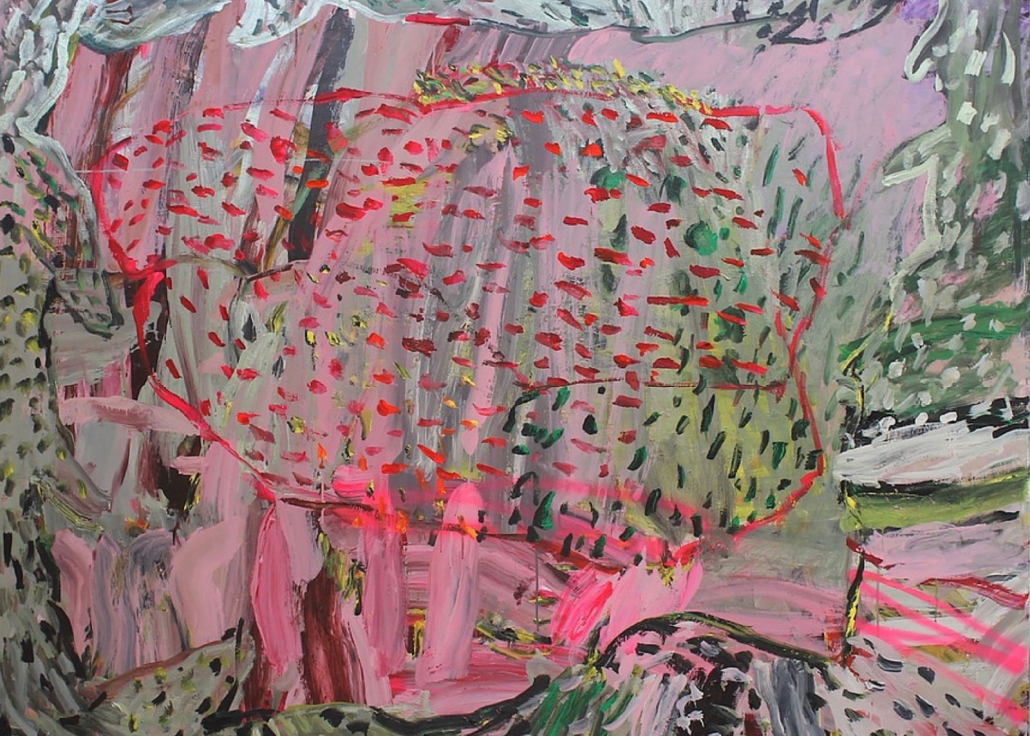Image: Catherine Cassidy, 2022.
‘Two iconic songs’
Andrew Collis
Land Sunday, Season of Creation A
Genesis 4:8-16; Romans 5:12-17; Matthew 12:38-40
When have you been moved by an encounter in and on the land? Working the soil, feeling the coolness or warmth of the earth … on your own, with others (companions, strangers), seen or unseen? Walking or running through rugged terrain … viewing or painting a landscape of some kind – with a sense of participation, anticipation … (I have experienced something like this on the south coast among the rocks and eucalypts, kangaroos and pelicans. Drawing and being drawn. Catherine Cassidy’s paintings provide inspiration.)
I recall a moving story about two musicians – Bidjigal singer-songwriter Uncle Vic Simms (born at La Perouse Mission in 1946) and “boy from Oz” Peter Allen (1944-1992). Two iconic songs set the scene: “Stranger In My Country” by Simms (written in 1973) and Allen’s 1979 anthem “I Still Call Australia Home”.
The two first met in the early 1960s. Simms was 16, Allen 18. On the road with Col Joye and entourage, they were frolicking around in Moree’s swimming pool when Simms was coldly informed he would have to leave (a ban on Aboriginal use of the pool was in force; activist Charles Perkins would later lead a Freedom Ride demonstration there). When Allen saw what was going on, he was outraged. At his instigation, the musicians collected their things and left in a show of solidarity.
Years later, following a stint at Bathurst Jail where Simms wrote and recorded one of Australia’s seminal country-rock albums, The Loner, before returning to the stage – playing prisons and festivals, schools and universities in Australia and Canada – the Elder and Deadly award winner recalls an affectionate and final meeting with Allen, a performer he lauds as “most inspiring” (Compass, ABC, 2016) …
Peter Allen was born in rural Tenterfield where his prodigious musical ability earned him disparaging nicknames and abuse. Still, he rose to fame and paved the way for a different kind of Australian man – flamboyant, flirtatious and unafraid of emotion. The Guardian’s Peter Taggart (2015) writes: “There was something courageous in the way Allen gave Australia the permission to be camp. He dragged us out of a dim, buttoned-up Englishness and took us on a permanent summer holiday, with maracas [and] leopard print …”
“Stranger In My Country” is an angry lament. Simms refers to land “taken” and Indigenous people “cast aside”. He sings: “Stranger in my country / Stranger in my land / Today to somewhere, no account / Tomorrow, something grand.” The land, it might be said, bears witness to invasion, to pain, to appeals for justice.
“I Still Call Australia Home” is a song of an exile/expatriate. Despite building a career and finding love overseas, Allen sings: “But no matter how far or how wide I roam / I still call Australia home.” The land draws him back, claims him as one of its own.
What moves me most is this emotional connection to the land – “my country” (Simms) and “home” (Allen).
Vic and Peter were friends. Their friendship was mediated by the land (in many modes and moods – from La Perouse to Tenterfield, Moree, Bathurst; Bidjigal and Gamilaroi country – grief, loss, life, hope). Their musical styles, their personal struggles were quite different …
But friendship maintains differences. Friendship is meeting without fusing, communing without totalising, discoursing without dissolving. Love for the land enables this respect for one another – respect for one another as strangers. The land is ever promise of justice, diversity …
The Genesis account of Eden may be read alongside an earlier reference in Ezekiel 28. Adam is a king expelled from a temple-palace-garden (Jerusalem) for sins of greed, arrogance, violence. The land, as in the text regarding Cain’s murder of Abel, bears witness to tragic loss – paradise lost, communion lost … lost wisdom (which may include the healing power of serpents [snake vine and other bush medicine] and the inherent goodness of humans regardless of gender).
Our gospel presents in miniature the drama of salvation which sees Jesus placed in a tomb at what we might regard the centre of the earth. The earth (land, country) becomes a place of new beginnings, rebirth. The risen Jesus, as Paul says, is the first fruit of a new creation of faithful nonviolence, or love. None of this happens without reference to the land, without the dirt or dust from which all are created.
Human salvation, of course, is inextricably linked to the land. The goodness, the communion for which we deeply long, involves our care of the land and its many different inhabitants, our delight in the land, our honouring the land … as wonderfully strange, as witness and post-colonial promise, as home.
There are many ways we might come to appreciate this.
Ngunawal poet Nick Paton writes: “This is what you need to know / Mother Earth will say / as I become threadbare // Winds of change / she tells me / are already on the way — // You’ll know when you’re ready / She says // Over thick skin I rub my hands / and listen deeply to Mother Country” (“Conduit”, translated by Jai Bell). Amen.




